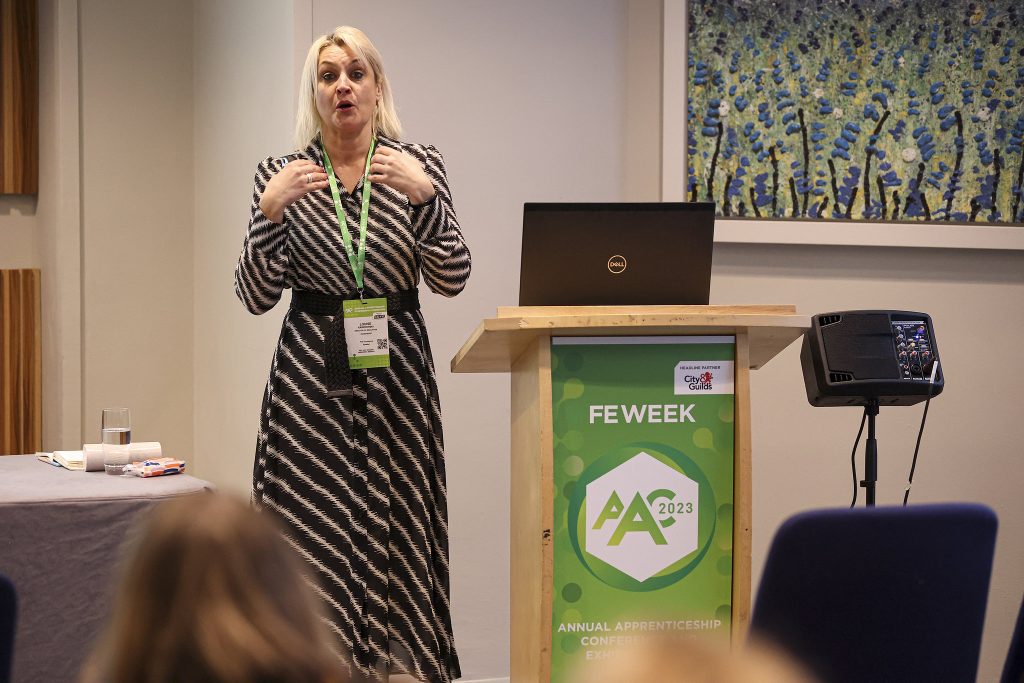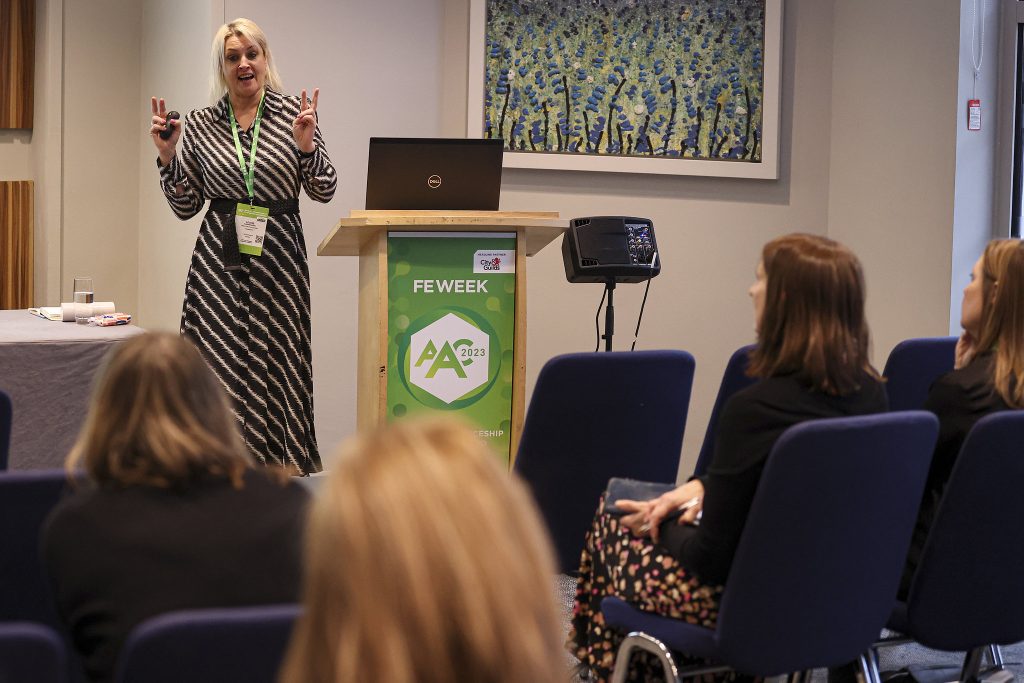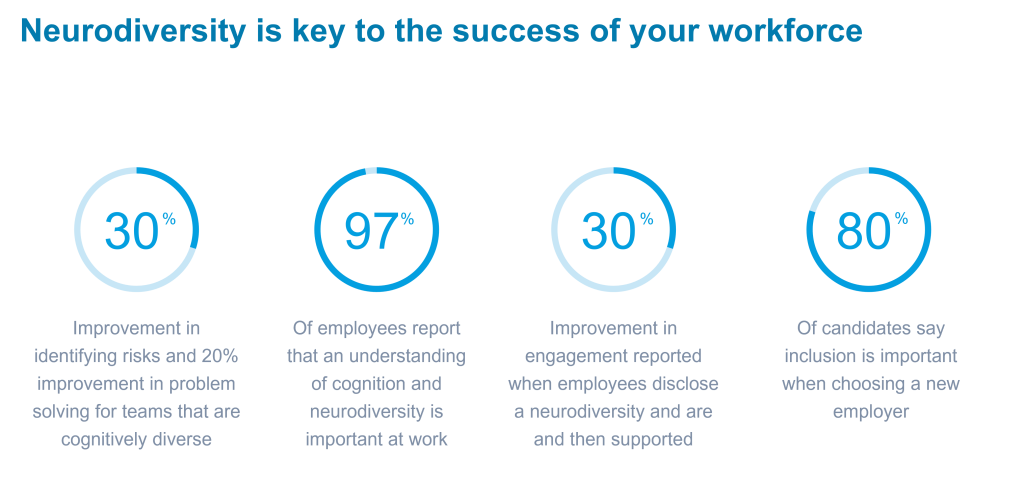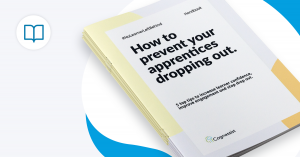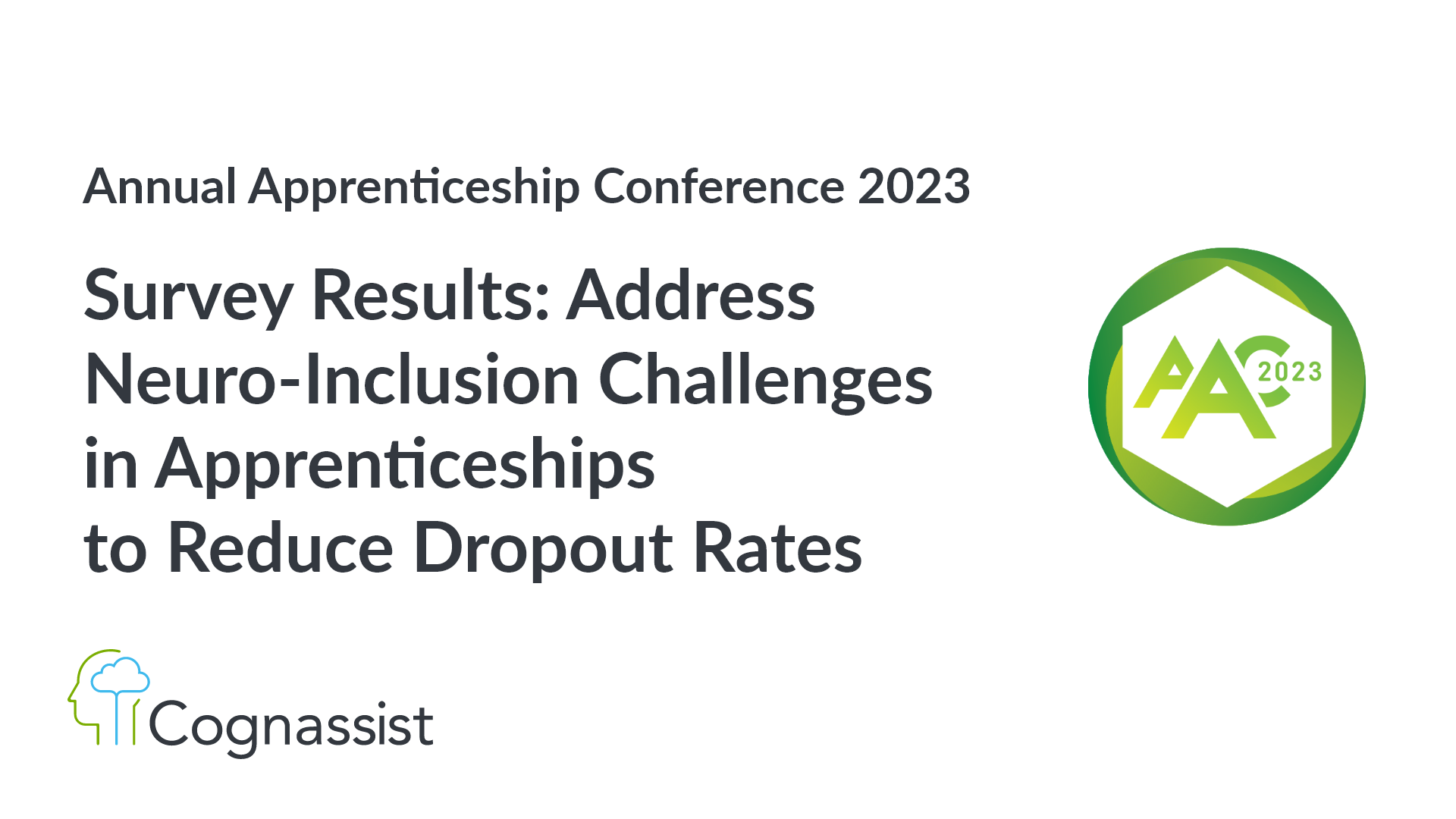
Annual Apprenticeship Conference
Survey Results: Address Neuro-Inclusion Challenges in Apprenticeships to Reduce Dropout Rates
The pressures on educators are immense.
We know there is a huge desire to make change, but just like there are barriers for learners in education, there are also barriers for educators looking to improve outcomes.
We spoke to multiple apprenticeship and FE providers at the Annual Apprenticeship Conference in Birmingham about the challenges facing organisations and what it will take to build an educational environment that meets the needs of all learners.
Learner neuro-inclusion: Now is the time
During Cognassist’s neuro-inclusion workshop, we asked four key questions to gauge opinions and insights from the sector on neuro-inclusion and learner support. We sought to discover the causes of learner dropout as perceived by providers, their aspirations for a neuro-inclusive culture, the measures they’ve taken so far and the type of internal support they would like to see to enable their staff. And the feedback can help to shape a path ahead.
For some, neuro-inclusion and learner support can feel like extra responsibilities and complications to teams with limited resources and funding. While it’s true that providers can’t improve neuro-inclusion alone, the future of the education system depends on a more personalised and adaptive approach that includes, celebrates and supports all kinds of minds.
Because better neuro-inclusion and adaptive support impact key educational outcomes, including dropout.
#1 In your opinion, what are the top three reasons for dropout?
Many providers reported issues with inadequate learning support, difficulty in functional skills, and tutors without sufficient experience of neurodiversity and working with different learning needs.
Throughout the conference, there were multiple workshops focused on neurodiversity and driving inclusivity and successful delivery of apprenticeships.
Amanda Spielman, Ofsted’s Chief inspector, addressed functional skills directly in her address at the Annual Apprenticeship conference, “We know that some of you have concerns about the reformed functional skills qualifications. You think they are harder to pass. The fact that pass rates are lower might support this, but of course there are other factors at play such as disruption to younger apprentices’ education.”
The opinions in the sector also align with the official data.
According to the most recent National Achievement Rates Tables in 2021, apprentices with learning differences have a lower retention rate (63%) than their peers (66%). These learners also experience lower average achievement rates (61.7%) than learners without specific learning needs (64.6%).
The Department for Education researched reasons for non-completion, “Non-completers often challenged the level of support they received and how responsive tutors were.” (DfE, 2019)
More recent research from the Learning & Work Institute found the same thing.
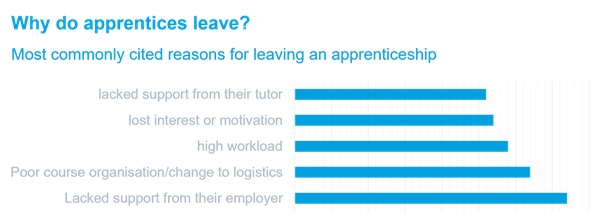
Source: Learning and Work Institute, (2022) Apprenticeships Outcomes and Destinations Report
It all points to one core target: quality education for all.
Your learning support provision and how you communicate that support to employers can make or break an apprentice’s experience.
But providers cannot be expected to do it alone.
Tutors should receive the support and training they need to deliver a robust provision that leaves no learner behind because employers want to hire neurodiverse talent.
Diverse teams often perform better, but inclusion is the only way to see diverse talent succeed. There needs to be a concerted effort to remove barriers early on and ensure progression for all learners.
#2 What does a neuro-inclusive culture look like to you?
Visualising the culture you want to attain will set your organisation’s aim and help to get leadership buy-in.
Most providers said an ‘understanding’ and ‘individualised’ culture mattered to them, alongside shared ownership for support and tailored support and adjustments that ensure equity of access.
Understanding neurodiversity needs an individualised approach.
And your understanding can only increase through training and increased awareness of how our differences can impact learning and our daily lives. Organisations like Cognassist aim to build internal expertise and offer tools to support this endeavour for organisations that need scalable support.
It’s important that providers get ahead of the SEND reforms.
The kind of culture you can create is dependent on the actions that you take now. We cannot afford to be complacent. We all need to be thinking about what we can do and how we can help each other.
#3 What steps do you currently take to ensure you are attracting neurodiverse talent?
Inclusive recruitment and hiring are critical first steps. These initial steps set the tone for everything that follows, and to be fully neuro-inclusive, neurodiverse candidates require support from the beginning before they even get hired.
An initial assessment is part of this process to identify learning needs or difficulties upfront and implement reasonable adjustments to enable completion.
The survey saw mixed responses and approaches, but there were providers who said they had no measures to attract neurodiverse talent.
Some of provider’s current measures included:
- Work experience programmes and internships
- Inclusive fonts and visual branding
- Simplified role profiles and interview processes
- Case studies and active promotion of supporting diverse learners
- Assessment centres and screening
- Sense checked adverts to everyone feels they can apply
- Job fairs and career days
- Flowcharts for policies and processes
It can be challenging to guarantee that your practices are truly inclusive.
If your current practices are not producing positive results, don’t hesitate to seek out advice and make change.
#4 What support would you like to see for training providers to improve retention and reduce dropout?
Now, it’s about what comes next for providers to improve all-important achievement rates.
And all the answers centred around three themes:
- More training for staff
- More collaboration with employers and learners themselves
- More resources and funding to enable effective support
Neuro-inclusion is a journey for providers, but one that scalable support can help to become more manageable and one that Cognassist is committed to supporting. Proactive steps are required ahead of National SEND reforms to ensure providers can meet expectations.
Our research shows that it is possible to predict dropout and improve apprentice’s confidence with the right support in place. From initial pilots with clients using bespoke algorithms, we were able to predict dropout with over 80% accuracy. We also ran a longitudinal study to measure the impact of our support alongside one-to-one support from providers. We found that after three months of support learner’s confidence increased by 14% on average and their motivation to learn increased by 16%.
Providers need to consider the effectiveness of their support to ensure best practice. A data-driven approach needs to be taken, as Ofsted are actively looking at comparative achievement rates for learners with high needs.
Speaking to providers, it is clear we are all committed to ensuring all learners can achieve their maximum potential, but there needs to be greater collaboration with external experts and strong leadership from organisations to prioritise and audit your learning support processes.
Events like the Annual Apprenticeship Conference are critical for sharing ideas and helping each other to continually make positive change.
Cognassist’s resources and advice are here to help you build change and more personalised support for learners. If these sector responses feel familiar to your organisation, we recommend reading our free handbook on “How to prevent your apprentice’s dropping out” using the link below.
You can also contact our team to learn more about our neuro-inclusion platform, cognitive needs assessment and neurodiversity training.
Here’s to creating inclusive education opportunities that enable diverse minds to thrive.
Download the handbook
Discover more to support your learners through awareness, guidance and insights.

Helen
Science Communications Manager
